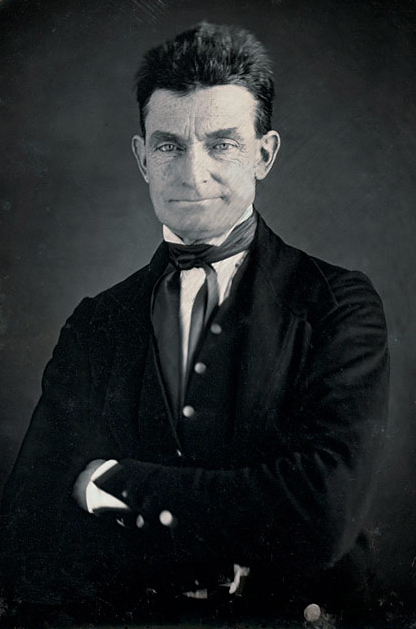John Brown foi um abolicionista norte-americano.
Abolicionista convicto, ao longo da década de 1850, defendeu e praticou ações armadas com o objetivo de abolir a escravidão nos Estados Unidos da América. Liderou, em 1856, o Massacre de Pottawatomie, no Kansas. Na ação, cinco pessoas foram mortas. Sua fama veio, principalmente, em função da fracassada ação no ataque ao arsenal de Harpers Ferry, quando acabou preso. O ataque ocorreu em 1859. Brown foi julgado e condenado à morte por enforcamento. Ao longo do julgamento, seus discursos ganharam projeção nacional. Brown foi chamado, entre outras alcunhas, de "o mais controverso norte-americano do século XIX" e "o primeiro terrorista doméstico dos EUA".Brown tentou iniciar, em 1859, um movimento de libertação entre os escravos de Harpers Ferry, uma cidade da Virgínia Ocidental. Com ajuda de alguns colegas sua ação colocou o país em polvorosa. O abolicionista acabou preso e julgado por traição ao Estado da Virgínia, pela morte de cinco sulistas defensores da escravidão e por incitar uma rebelião de escravos. Brown foi declarado culpado de todos os crimes e enforcado. Sulistas alegaram que o tipo de movimento liderado por Brown era apenas a ponta do iceberg representado pelas ideias abolicionistas do Partido Republicano. Historiadores afirmam que o conflito em Harpers Ferry precipitou as tensões que, em seguida, levariam à secessão norte-americana e à guerra civil ocorrida nos Estados Unidos entre 1861 e 1865.
Brown inicialmente obteve certa projeção quando liderou um grupo de voluntários durante o episódio conhecido como Kansas Sangrento, ocorrido em meados dos anos 1850. O acontecimento foi marcado por violentos confrontos entre antiescravagistas e partidários da escravidão. Diferentemente de outros nortistas que defendiam uma resistência pacífica à escravidão, Brown apoiava ações violentas em resposta às agressões escravagistas do Sul dos EUA. Insatisfeito com o pacifismo pretendido pelo movimento abolicionista organizado, ele supostamente teria dito que "Estes homens estão todos falando. Nós precisamos de ação - ação!" Durante sua campanha no Kansas, Brown e seus homens assassinaram cinco escravagistas do Sul, no que ficou conhecido como o "Massacre de Pottawatomie", em maio de 1856. Em 1859, ele liderou um ataque ao depósito federal de armas de Harpers Ferry. Durante o ataque, tomou o depósito; sete pessoas foram mortas e 10 ou mais ficaram feridas. Brown pretendia espalhar entre os escravos as armas obtidas no arsenal militar, mas seu plano falhou. Ao longo de 36 horas, seus homens fugiram, foram mortos ou capturados por escravagistas armados, milicianos e marines comandados por Robert Lee. A captura de Brown chamou a atenção da população norte-americana, basicamente em função do medo dos sulistas de que aquele fosse apenas o primeiro de muitos planos nortistas para acabar com a escravidão e ameaçar as próprias vidas dos habitantes daqueles estados. Ao longo do período, no entanto, os Republicanos do norte reafirmaram que esta ideia estava equivocada e que não haveria interferência no sistema escravista do sul dos EUA.Historiadores concordam que John Brown desempenhou um importante papel no início da Guerra Civil norte-americana. Davis Potter afirmou que o efeito emocional dos ataques de Brown foi ainda maior que o impacto filosófico dos Debates_Lincoln–Douglas, revelando uma profunda divisão entre o Norte e o Sul dos EUA. As ações e táticas de Brown, anteriores à Guerra, fizeram dele uma figura controversa. Eventualmente, é visto por ângulos distintos, à luz da história: ora como um mártir heroico da liberdade, ora como um vilão, desequilibrado e terrorista. Alguns escritores, como Bruce Olds, definem-no como um fanático obcecado, enquanto outros, como Stephen B. Oates, enxergam em Brown "um dos mais perceptivos seres humanos de sua geração". Davis S. Reynolds, por sua vez, considera-o como "o homem que acabou com a escravidão, acendeu a fagulha da Guerra Civil e plantou a semente dos direitos civis". Richard Owen Boyer enfatizou que Brown "deu a sua vida para que milhões de outros norte-americanos pudessem ter liberdade". Para Ken Chowder, ele "em certo período, foi um grande homem", mas, também, foi "o pai do terrorismo nos EUA". A música "John Brown's Body" tornou-se um hino durante a Guerra Civil Norte-americana.
Wikipedia
✵
9. Maio 1800 – 2. Dezembro 1859
